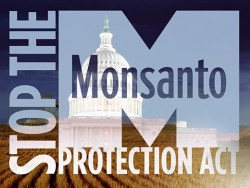Smuggled into the bill President Obama signed to avert a government shutdown in March was a sneaky little rider called the “farmer assurance provision.” It’s since come to be known as the Monsanto Protection Act, being very assuring to the biotech giant, if no one else. It allows farmers to plant genetically modified crops before they’ve been declared safe by the U.S. Department of Agriculture, in defiance of court orders suspending planting until environmental reviews can be completed.
Once food-advocacy groups and then the general public found out about the quietly passed provision, outcry against it spread, in the form of petitions and even rare displays of bipartisan solidarity. On Monday, Sen. Jeff Merkley (D-Ore.) announced that he’s introducing an amendment to the Senate version of the farm bill that would repeal the Monsanto Protection Act in its entirety.
“The Monsanto Protection Act is an outrageous example of a special interest loophole,” said Merkley in a press release. “This provision nullifies the actions of a court that is enforcing the law to protect farmers, the environment and public health. That is unacceptable.”
Twilight Greenaway explained the background of this special-interest loophole for Grist last year:
As it stands now, the U.S. Department of Agriculture (USDA) can suspend planting while the environmental impact of one of these crops is being assessed. Or that’s how it’s been in theory at least.
And it is what happened in 2007 when a federal judge overturned the USDA’s approval of GMO alfalfa, in response to a lawsuit filed by farmers and the Center for Food Safety. (Planting of alfalfa resumed again in 2011 when the USDA fully deregulated the crop.)
In the case of GMO sugar beets, another hotly contested crop, planting was supposed to be suspended, but by the point that suspension was ordered, the market had been cleared out and there were no longer enough non-GMO seeds. As we reported recently, “America faced the prospect of a 20-percent reduction in that year’s sugar crop. In response — and in defiance of the federal judge’s order — the USDA allowed farmers to plant GM sugar beets anyway.” Now, all this back and forth could be moot to most farmers (unless a crop is officially, finally deemed unsafe — and well, that hasn’t happened yet).
The problem with planting GMO crops before they’ve been proven safe is that doing so doesn’t only affect the fields in which they’re sown; cross-pollination is a common concern for farmers trying to practice sustainable agriculture and maintain their organic status in an industry dominated by GM seeds. Cross-pollination can even bring legal troubles for unsuspecting farmers, Tom Laskawy explains:
[I]f you’re a farmer, GMO seeds can literally blow in to your fields on the breeze or just the pollen from GMO crops can blow in (or buzz in via bees) and contaminate your organic or “conventional” fields. And if that happens, Monsanto or Syngenta or Bayer CropLife maintain the right to sue you as if you had illegally bought their seed and knowingly planted it.
In an appropriately Orwellian twist, the companies even call such accidental contamination by their products “patent infringement.”
Merkley’s amendment attempts to help the USDA cling to what small scraps of control it still has over the biotech industry. He plans to push for a floor vote on it, according to The Huffington Post. Stay tuned …





